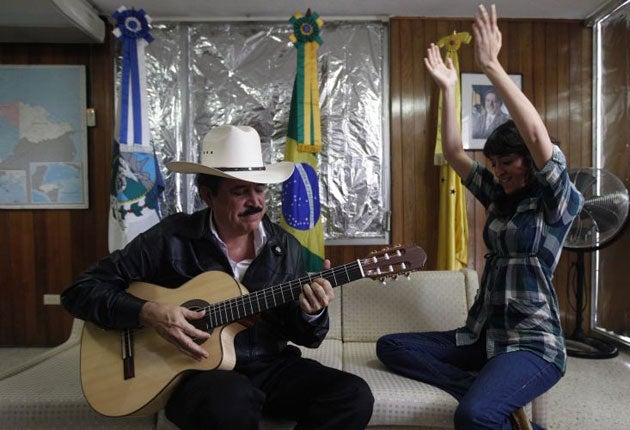Honduran crisis 'threatens democracy'
Latin America faces wave of coups if world fails to take notice, says adviser

Your support helps us to tell the story
From reproductive rights to climate change to Big Tech, The Independent is on the ground when the story is developing. Whether it's investigating the financials of Elon Musk's pro-Trump PAC or producing our latest documentary, 'The A Word', which shines a light on the American women fighting for reproductive rights, we know how important it is to parse out the facts from the messaging.
At such a critical moment in US history, we need reporters on the ground. Your donation allows us to keep sending journalists to speak to both sides of the story.
The Independent is trusted by Americans across the entire political spectrum. And unlike many other quality news outlets, we choose not to lock Americans out of our reporting and analysis with paywalls. We believe quality journalism should be available to everyone, paid for by those who can afford it.
Your support makes all the difference.A rash of military coups could be triggered across Latin America if the world fails to stand up to the illegal regime in Honduras, a close aide of the ousted president Manuel Zelaya warned yesterday.
"The fate of Honduras is not just the fate of Honduras, but of the Latin American continent," Mr Zelaya's special adviser Allan Fajaro told The Independent. "Dark forces," he said, were watching to see how the crisis ends. "If we resolve this constitutionally they will know they too have to respect democracy. If not, these dark forces will know they have a green light and the continent will become an erupting volcano. That will be a very bad outcome, not only for our continent, but for Europe and the world."
The political crisis in Honduras began four months ago when Mr Zelaya, the democratically elected president, was taken from his bed at gunpoint and flown out of the country by the military. A US-brokered power-sharing deal which should have returned Mr Zelaya to his post, at least until elections on 29 November, collapsed last week after Roberto Micheletti, who seized power after the coup, reneged by forming a caretaker government without him.
Mr Zelaya, forced to take refuge inside the Brazilian embassy in the Honduran capital Tegucigalpa, is now calling for a boycott of the elections. Against a background of wavering support in Washington, he wants European governments to issue a clear warning that they will not recognise the results.
His special adviser, who is touring EU capitals to plead for increased pressure, urged Britain to sponsor a joint European initiative warning of diplomatic isolation and the suspension of aid."But what is most urgently needed is a clear and forceful statement from Britain and its European partners, that elections under this regime will not be accepted", Mr Fajaro said in London. "This would send a powerful message to the coup leaders. We are asking the British government to state forcefully and clearly that they will not recognise elections conducted in this repressive and illegitimate context."
The Obama administration sparked outrage from its allies in Latin America and across the world last week after it appeared to recognise the coup regime by signalling it could accept the legitimacy of the elections, even if Mr Zelaya is not first reinstated. Neither Mr Zelaya nor Mr Micheletti are candidates in the election. The reputation of the Obama administration could be damaged by its handling of the crisis he said, adding that conservative figures with links to the coup leaders had successfully lobbied the Secretary of State Hillary Clinton.
Mr Fajaro said tensions could spill over into violence and even civil war. But there was also a risk of a domino effect across Latin America, with anti-government forces in Paraguay and Bolivia already threatening military takeovers. Mr Zelaya's only crime, in the eyes of the "putschists", he said, was that he reduced poverty and inequality. "The oligarchy, who perpetrated this coup, feared him and they are composed of just 10 families. He's in this situation because he did not defend the interests of the elite."
Conditions inside the Brazilian embassy, where Mr Zelaya has been holed up since 21 September are "like a prison" he went on. "All his food is searched, even with bare hands. They have pumped noxious gases into the building, constant noise is blaring, the lights are on all night and we think they might be digging under the building. This is all to break his spirit but Manuel remains very strong. He knows he is fighting for democracy and helping to write history".
Join our commenting forum
Join thought-provoking conversations, follow other Independent readers and see their replies
Comments